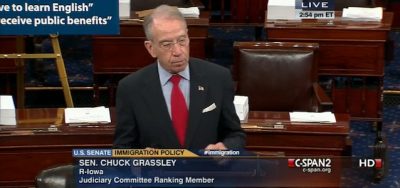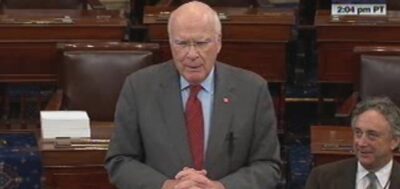Immigration Reform
The last time Congress updated our legal immigration system was November 1990, one month before the World Wide Web went online. We are long overdue for comprehensive immigration reform.
Through immigration reform, we can provide noncitizens with a system of justice that provides due process of law and a meaningful opportunity to be heard. Because it can be a contentious and wide-ranging issue, we aim to provide advocates with facts and work to move bipartisan solutions forward. Read more about topics like legalization for undocumented immigrants and border security below.
How the Senate Votes On Amendments
The Senate voted on four amendments to the immigration reform bill today, starting the ball rolling on what is likely to be a series of amendment votes over the next few days. The Senate rejected two votes requiring more enforcement at the border as a condition of implementing or completing a legalization program: Vitter 1228, which failed 36-58, and Thune 1197, which failed 39-54. Two other amendments were less divisive: Tester 1198, adding tribal governments to the Border Task Force, which passed 94-0 and Landrieu 1222, an adoption measure, which passed on a voice vote. In each case, in order to be adopted, a sixty vote threshold was required, rather than a simple majority, which has become the norm in the Senate. Needless to say, the variety of votes and rules can be confusing, leading to the need for some background on the amendment process. Read More

Happy Birthday DACA!
A year ago, President Obama announced the DACA program from the steps of the White House Rose Garden. The announcement marked a victory for thousands of undocumented immigrant youth whose courage and activism inspired the Administration to take action. Since that day, over half a million young immigrants have come forward under DACA to seek relief from deportation and to secure work authorization. Read More

Busting the Myth of the “Job Stealing” Immigrant
Some critics of the immigration bill now winding its way through the Senate claim that it would increase unemployment among native-born workers—especially minorities—by adding more immigrants to an already tight job market. In fact, both the legalization and “future flow” provisions of the bill would empower immigrant workers to spend more, invest more, and pay more in taxes—all of which would create new jobs. Contrary to the simplistic arithmetic of immigration restrictionists, employment is not a “zero sum” game in which workers compete for some fixed number of jobs. All workers are also consumers, taxpayers, and—in many cases—entrepreneurs who engage in job-creating economic activity every day. Read More

House Immigration Bill Promotes Old Model Immigration Solutions
Today the House held a hearing on H.R. 2278, the "Strengthen and Fortify Enforcement Act" (the SAFE Act), which is designed, as its name suggests, to be a lopsided, enforcement-only bill that imposes additional criminal penalties, border security, and detention and deportation, while encouraging discredited policies such as self-deportation and state interference with immigration law. Instead of these old enforcement-only policies, which do not work, what is needed is a comprehensive solution that fixes our broken legal immigration system and provides a path to earned legalization. Read More

Border Security Amendments To Delay Legalization Harm Immigration Bill Efforts
During The first full day of debate after the Senate approved a motion to proceed to S. 744, the Border Security, Economic Opportunity, and Immigration Modernization Act, several Senators sought to make the debate all about border security. In the process, they proposed amendments that tie border security increases to the start of the legalization program in ways that make legalization a virtually unattainable goal. One of these amendments is from Sen. John Cornyn (R-TX). His RESULTS amendment ties the fate of unauthorized immigrants who are already living in the United States, and who have applied for legalization, to the success of highly stringent border-enforcement measures in deterring future unauthorized immigration. However, applicants for legalization have no control over the ability of the federal government to maintain the integrity of U.S. borders, so there is no logical reason to link their legal status to border-enforcement metrics. The RESULTS amendment also mistakenly views immigration reform as a two-step process: enforcement, followed by legalization. However, the various components of immigration reform must be implemented simultaneously to maximize their effectiveness. The amendment breaks apart what should by a single, integrated revamping of U.S. immigration policy. Finally, the RESULTS amendment contains no mechanism for judging the feasibility or cost-effectiveness of the border-security measures and metrics that it would mandate. Read More

The Economic Blame Game: Immigration and Unemployment
One of the most persistent myths about the economics of immigration is that every immigrant added to the U.S. labor force amounts to a job lost by a native-born worker, or that every job loss for a native-born worker is evidence that there is need for one less immigrant worker. However, this is not how labor-force dynamics work in the real world. The notion that unemployed natives could simply be “swapped” for employed immigrants is not economically valid. In reality, native workers and immigrant workers are not easily interchangeable. Even if unemployed native workers were willing to travel across the country or take jobs for which they are overqualified, that is hardly a long-term strategy for economic recovery. There is no direct correlation between immigration and unemployment. Read More

Allies, Not Enemies: How Latino Immigration Boosts African American Employment and Wages
Latino immigrants and African Americans fill complementary roles in the labor market—they are not simply substitutes for one another. Read More

Senate Overwhelmingly Approves Motion To Proceed To Immigration Bill
S. 744, the Gang of Eight’s immigration reform bill, cleared another significant hurdle today when the Senate approved a motion to proceed to the legislation. The motion to proceed passed overwhelmingly by a vote of 84-15. Read More

Procedural Path Of The Senate Immigration Bill
The Senate immigration reform debate has officially begun. Senate Majority Leader Harry Reid (D-NV) filed cloture on the motion to proceed Thursday on S. 744, the “Border Security, Economic Opportunity, and Immigration Modernization Act,” the first step to having the full Senate debate the measure after the Senate Judiciary Committee approved it a few weeks ago. Senators started to make their cases for and against the bill during floor speeches on Friday. On Tuesday, the Senate will vote to end debate on the motion to proceed to the immigration bill at 2:15 p.m. Tuesday and then vote to proceed at 4 p.m. Read More

Immigrant Entrepreneurs Grow Industries and Create Jobs
As you might suspect, immigrant entrepreneurs are key drivers in the transportation, food and building services industries. And a recent report from the Immigrant Learning Center (ILC) shines a spotlight on immigrant entrepreneurship in these industries, with a particular geographic focus on Massachusetts, New York, and Pennsylvania. Concerning the three industry areas, the ILC study – through an analysis of public data and interviews with immigrant business owners and industry representatives – finds the following: Read More
Make a contribution
Make a direct impact on the lives of immigrants.
